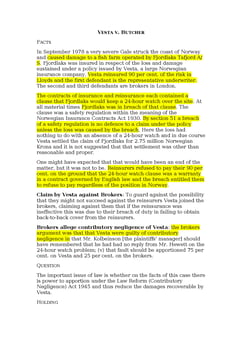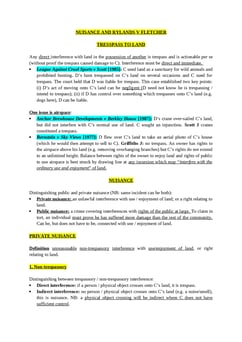Lagden v O’Connor [2004] 1 All ER 277
Judgement for the case Lagden v O’Connor
Table Of Contents
Defendant negligently damaged Plaintiff’s car and since Plaintiff couldn’t afford to hire a replacement, he obtained an agreement with a hire-credit firm that they would provide a car free of charge provided they could claim back the cost of the hire (which they charged far above the standard hire cost) from Defendant’s insurers.
Defendant disputed that he had to pay the high cost of Plaintiff’s replacement car.
HL said that Defendant had to pay the cost, as not too remote an expenditure.
-
HL held that generally only the standard cost of hiring a car could be recovered, but an exception was granted where Plaintiff was really so poor as to be pushed towards the higher rates of a hire-credit firm.
(Not necessarily an exception to the general “reasonable foreseeability” rule: it could be construed as the economic equivalent of the think skull test, whereby the cost of replacement is inevitably greater on Plaintiff for being poor, just as the physical injury in Leech Brain was extended due to the deceased’s condition).
RELATED CASES
For Further Study on Lagden v O’Connor
Need instant answers? Our AI exam tutor is here to help.
Ask questions 🙋 Get answers 📔 It's simple 👁️👄👁️
Our AI is educated by the highest scoring students across all subjects and schools. Join hundreds of your peers today.
Get StartedSimilar Cases
Related Product Samples
These product samples contain the same concepts we cover in this case.
| Commercial Remedies BCL | Coles V. Hetherton Notes (5 pages) |
| Commercial Remedies BCL | Dimond V. Lovell Notes (4 pages) |
| Commercial Remedies BCL | Langden V. O'conno Notes (5 pages) |


 Since 2010, Oxbridge Notes has been a trusted education marketplace, supplying high-quality materials from top achievers at universities like Oxford, Cambridge, LSE, Harvard, and Yale.
Since 2010, Oxbridge Notes has been a trusted education marketplace, supplying high-quality materials from top achievers at universities like Oxford, Cambridge, LSE, Harvard, and Yale.